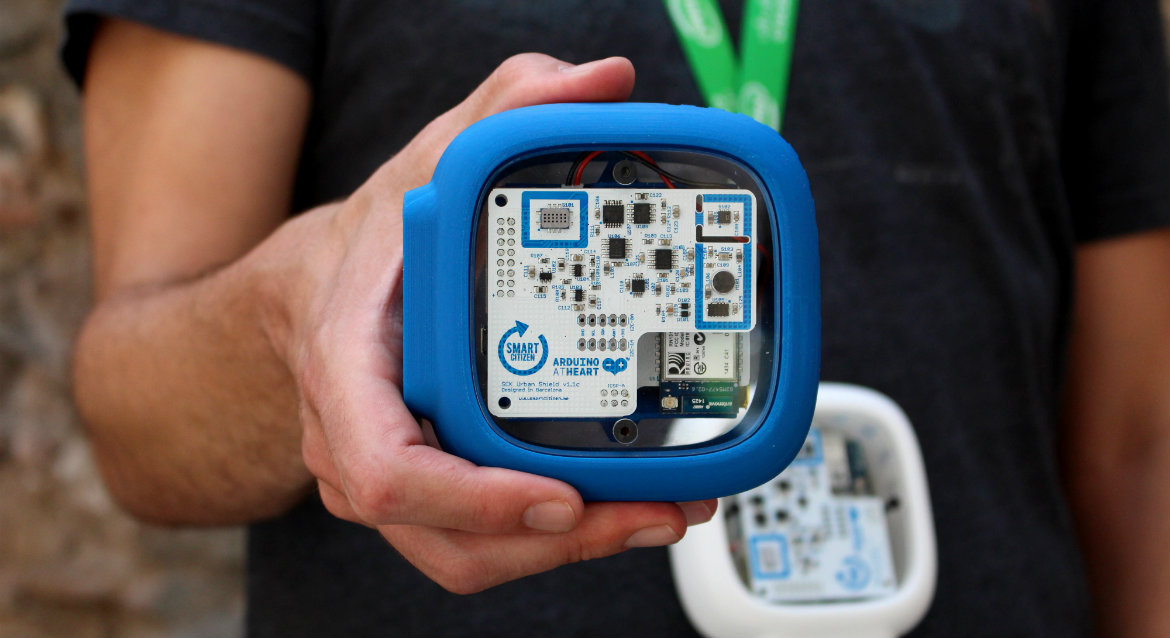New toolkit empowers citizens to tackle environmental pollution
Published On Mon 29 Jan 2018 by Grant Hill

- New toolkit from University of Dundee and European partners helps citizens capture environmental data themselves to solve local problems with pollution
- Grassroots groups across Europe have been using low-cost data collection technology to stimulate local government change
- Initial toolkit print run of 3,500 and free to download today
Residents affected by issues such as noise or air pollution often feel helpless and ignored, but a University of Dundee-led project is enabling them to gather the facts they need to kick-start change.
Citizen Sensing – A Toolkit is a new guide thatempowers citizens to become active in capturing, sharing and making sense of data on the local environment using low-cost sensors and mobile phone apps. By gathering evidence and raising awareness of the problems they face, citizens are able to organise an effective grassroots, community or local government response.
The publication is the culmination of Making Sense, a project led by University in collaboration with several European partners and funded by the European Commission’s Horizon 2020 programme.
Making Sense has already led to significant real-world environmental improvements. Project partners have spent the last 26 months empowering citizen sensing campaigns across three cities – Barcelona in Spain, Prishtina in Kosovo and Amsterdam in Netherlands, using Citizen Science and Sensing to monitor the local environment such as air quality and noise pollution.
Mel Woods, Reader in Creative Intelligence at University, said, “The Making Sense project set out to address citizens’ concerns about pollution by putting low-cost, open source technology in the hands of communities. However, we quickly learned that people do not just want a sensor, they want to show and evidence the problem of pollution, then make change happen.
“Now, with the Making Sense Toolkit we can support new communities, local authorities, health institutes, and grassroots organisations to create and sustain this legacy, it is critical to share this so others can also change their environment for the better.”
The University has led the production, delivery and publication of the book which will have an initial print run of 3,500 copies and is available to download for free online.
The guide includes case-studies, practical advice, and step-by-step guides which demonstrate how citizen data-capture has led to real world change.
One case-study featured is of The Plaça del Sol in Barcelona, a town square that has historically experienced high levels of noise from revellers into the early hours of the morning. Working with the Making Sense team, the neighbourhood association of the Plaça del Sol researched and measured how high noise levels around the plaça were in relation to the norm.
The project demonstrated that noise levels in the area were above those recommended by the World Health Organisation (WHO) and were incompatible with local legislation. Armed with this data, members of the community could present this to their local council which opened up dialogue and helped pave way for solutions.
The city council has since initiated refurbishment works, such as the installation of large flower planter, to deter revellers from congregating in some areas of the square and is now in discussion with local residents to find other ways to cut noise pollution in the area.
Dundee’s partners include JRC, Brussels, IaAC, Barcelona, PEN and Science for Change, Kosovo, WAAG Society and University of Twente, Netherlands.
For media enquiries contact:
Grant Hill
Press Officer
University of Dundee
Nethergate, Dundee, DD1 4HN
Tel: +44 (0)1382 384768
Mobile: 07854 953277
Email: g.hill@dundee.ac.uk